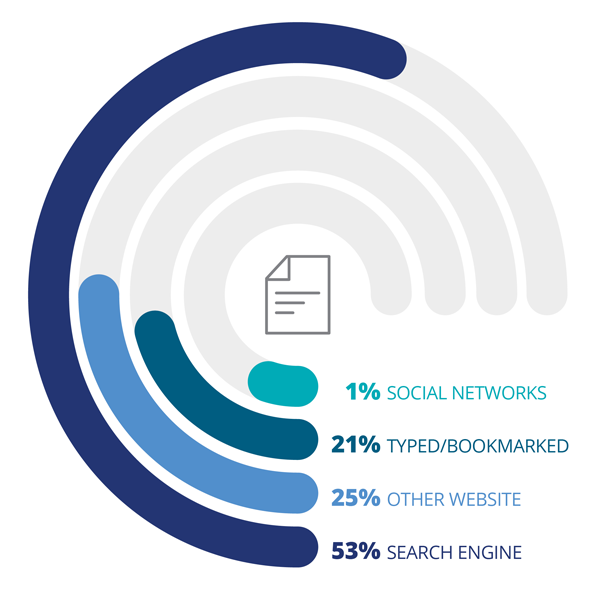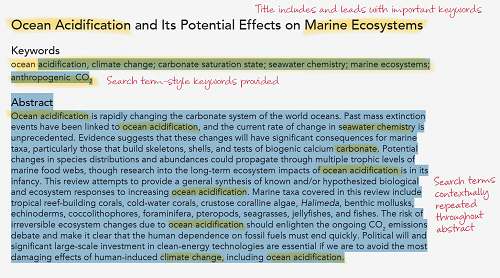This website uses cookies to ensure you get the best experience on our website.
To learn more about our privacy policy Click herePrivacy Preference
Wisata Pulau Seribu » Discussions
Search Engine Optimization (SEO) for your article
-
More than 50% of traffic to Wiley Online Library comes directly from Google, Google Scholar, and other search engines. Wiley does everything possible to ensure that all research content is visible and high ranking in the search results of Google and other engines.More than 50% of traffic to Wiley Online Library comes directly from Google, Google Scholar, and other search engines. Wiley does everything possible to ensure that all research content is visible and high ranking in the search results of Google and other engines. You can also play a crucial role in optimizing the search results for your article – helping people to find, read, and cite your work.
You can also play a crucial role in optimizing the search results for your article – helping people to find, read, and cite your work.

5 tips for increasing your article's search engine discoverability
1. Create a search engine friendly title
- Include 1-2 keywords related to your topic
Place your keywords within the first 65 characters of your title
- Keep your title short
Consider moving a phrase from your title to the first or second sentence of your abstract
2. Optimize your abstract
- Place essential findings and keywords in the first two sentences of your abstract
Only the first two sentences normally display in search engine results
- Repeat your keywords 3-6 times
Don't forget the purpose of your abstract is to express the key points of your research, clearly, and concisely
See below for an example of a well-optimized abstract.

3. Use keywords throughout your article
- Include keywords in your title (1-2), abstract (2-3), and keyword fields (5-7)
Keywords may be keyword phrases rather than just single words
- Incorporate keywords in your headings too
Headings tip off search engines to the structure and content of your article
- Find specific keywords on Google Trends and Google Adwords keyword tools
Remember that keywords are important for A&I services as well as SEO
- Use keywords consistent with your field
If you're unsure, check the words used in your field's major papers
- Let keywords flow naturally and in a contextual way
Search engines dislike too much keyword repetition, known as keyword stuffing, and may 'un-index' your article, making it hard to find online
4. Be consistent
- Refer to author names and initials in a consistent manner throughout the paper
Remember to be consistent with any previous online publications
5. Build links
- Link to your article across your social media, networking, and institutional sites
The more in-bound links to your article, the more search engines like Google will value and highlight your content
- Encourage colleagues to link to your article
The more links from respected individuals/trusted sites the more powerful the effect. Don't forget to do the same for them!
5 tips for increasing your article's search engine discoverability
1. Create a search engine friendly title
- Include 1-2 keywords related to your topic
- Keep your title short
2. Optimize your abstract
- Place essential findings and keywords in the first two sentences of your abstract
- Repeat your keywords 3-6 times
[i]See below for an example of a well-optimized abstract.[/i]

3. Use keywords throughout your article
- Include keywords in your title (1-2), abstract (2-3), and keyword fields (5-7)
- Incorporate keywords in your headings too
- Find specific keywords on [url=https://www.google.com/trends/]Google Trends[/url] and [url=https://adwords.google.com/KeywordPlanner]Google Adwords[/url] keyword tools
- Use keywords consistent with your field
- Let keywords flow naturally and in a contextual way
4. Be consistent
- Refer to author names and initials in a consistent manner throughout the paper
5. Build links
- Link to your article across your social media, networking, and institutional sites
- Encourage colleagues to link to your article
-
When a small, medium or big sized business needs a competent search engine optimization (SEO) consultant, there are four options available. So, what are the challenges and what is the best option for your company? There are many points to consider before taking your decision. Ysais SEO HoustonWhen a small, medium or big sized business needs a competent search engine optimization (SEO) consultant, there are four options available. So, what are the challenges and what is the best option for your company? There are many points to consider before taking your decision. [url=https://ysais-seo.com/houston-seo/]Ysais SEO Houston[/url]
-
I have begun making notes with the tips that you Goa EscortI have begun making notes with the tips that you [url=http://www.amydsouza.in/]Goa Escort[/url] shared a day or two back. This breezes up being a snappier way.
shared a day or two back. This breezes up being a snappier way. -
Beneficial story! I must say i relished their digesting. I hope to view greater of your stuff. It is my opinion you have got remarkable information along with visualization. What i am remarkably encouraged using resources. INDIAN VISA FOR KENYAN CITIZENSBeneficial story! I must say i relished their digesting. I hope to view greater of your stuff. It is my opinion you have got remarkable information along with visualization. What i am remarkably encouraged using resources. [url=https://www.indian-visa-online.com/india-evisa-for-kenyan-citizens/]INDIAN VISA FOR KENYAN CITIZENS[/url]
-
Deposit pulsa tanpa potongan has become my go-to method for funding my online gambling activities, as it saves me time and effort. https://s.id/deposit-pulsa-tanpa-potonganDeposit pulsa tanpa potongan has become my go-to method for funding my online gambling activities, as it saves me time and effort. https://s.id/deposit-pulsa-tanpa-potongan
-
I in the past left a comment on the web site and selected alert me about latest responses. Perhaps there is a way to eliminate that system? I am getting numerous mails. check it outI in the past left a comment on the web site and selected alert me about latest responses. Perhaps there is a way to eliminate that system? I am getting numerous mails. check it out
-
always avoid plastic tv mounts when possible and buy those aluminum or steel tv mounts because they last longer“ un curso de milagrosalways avoid plastic tv mounts when possible and buy those aluminum or steel tv mounts because they last longer“ un curso de milagros
-
Whoah this weblog is great i like studying your articles. Keep up the good work! You already know, a lot of people are searching around for this information, you could aid them greatly. UFABETเว็บตรงไม่ผ่านเอเย่นต์Whoah this weblog is great i like studying your articles. Keep up the good work! You already know, a lot of people are searching around for this information, you could aid them greatly. UFABETเว็บตรงไม่ผ่านเอเย่นต์
-
Awesome post, where is the rss? I cant find it! Junk Car Buyers in [Your Location]Awesome post, where is the rss? I cant find it! Junk Car Buyers in [Your Location]
-
I favor a variety of blogposts, My spouse and i really appreciated, I need specifics of the idea, considering that it's very amazing., Kind regards associated with providing. 출장안마I favor a variety of blogposts, My spouse and i really appreciated, I need specifics of the idea, considering that it's very amazing., Kind regards associated with providing. 출장안마




